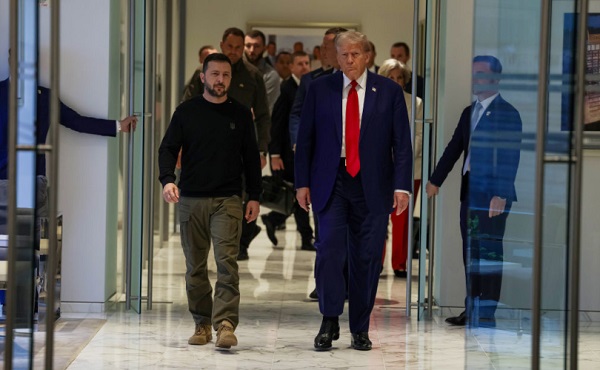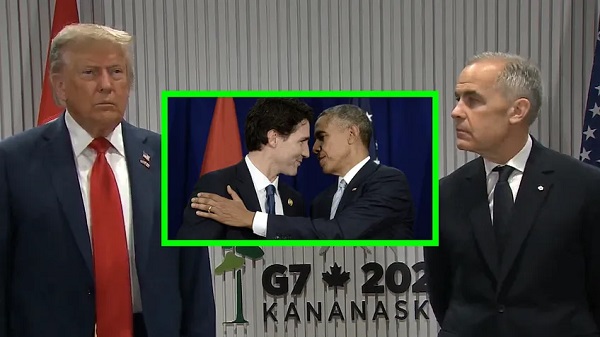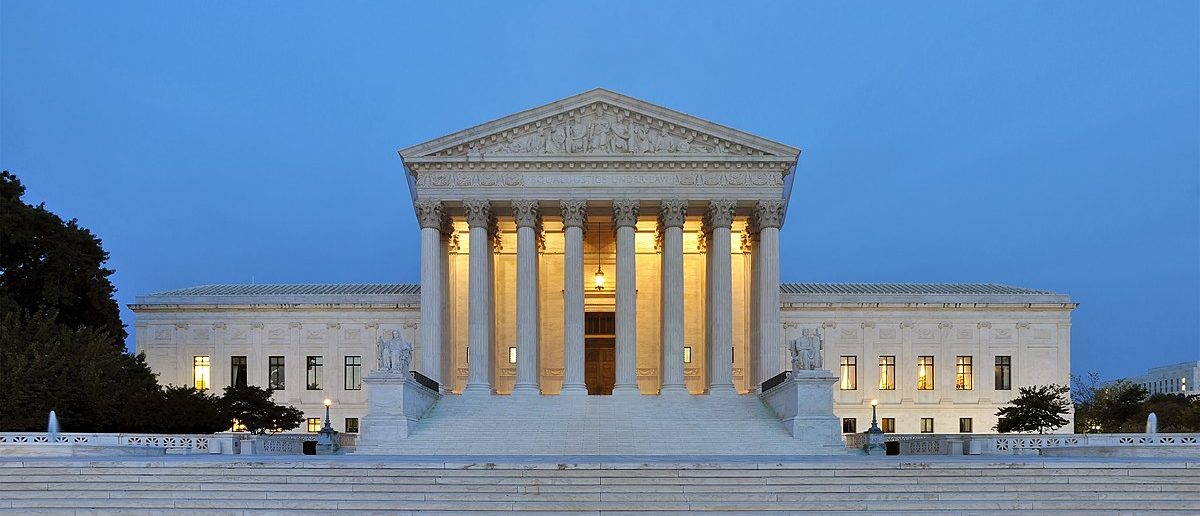conflict
Trump’s election victory shows the American people want peace in Ukraine

From LifeSiteNews
By Bob Marshall
Americans resolutely rejected Kamala Harris’s war policies, electing Donald Trump on a platform of de-escalation. Joe Biden’s late delegation of missile control to President Zelensky and $24 billion funding serves only to deepen global conflict and risk elevation to WWIII
On November 5, 2024, American voters rendered their verdicts on several important questions where Donald Trump and Kamala Harris had polar opposite policies. The Russia-Ukraine war was one of them.
- In September, Trump said, “I want the war to stop. I want to save lives that are being uselessly killed by the millions…. It’s so much worse than the numbers that you’re getting.”
- Harris, after having opposed a peace agreement worked out between Ukraine and Russia in 2022, said in late September, “I will work to ensure Ukraine prevails in this war.”
- Harris, who reminded us constantly that “democracy [was] on the ballot” here in the United States, seemed to care not a bit that Ukrainian President Volodymyr Zelensky had canceled Ukraine’s elections, perhaps in a bid to avoid his own voters. Further, in a Gallup poll of Ukraine, conducted in August and October 2024, “an average of 52% of Ukrainians would like to see their country negotiate an end to the war as soon as possible. Nearly four in 10 Ukrainians (38%) believe their country should keep fighting until victory.”
When many millions of Americans and Ukrainians clearly want peace, and neither Joe Biden nor Kamala Harris can define “victory,” what are we to make of Joe Biden’s two, giant, post-election steps toward expanding the war into Russia proper and central Europe?
- Step 1) Initiating unprecedented direct missile strikes on Russia: Biden took the first step on November 17, 2024, when he (or his handlers) delegated his authority over targeting U.S. ATACMS long-range missile batteries in Ukraine to Volodymyr Zelensky. Not only did Biden authorize Zelensky to select targets inside the Russian Federation, he also authorized Zelensky to have virtual command and control through U.S. military and civilian personnel who are the only military forces capable of firing these missiles and using NATO/U.S. satellites to guide them to the Russian and North Korean facilities, soldiers, and civilians Zelensky wanted destroyed or killed!
- Step 2) Asking Congress to write Biden another Ukraine war check: President Biden wants a Supplemental Appropriations of $24 billion for Ukraine before he leaves office on January 20, 2025. Speaker Mike Johnson (R-LA) wisely refused to permit a lame-duck Congress to authorize Biden and Zelensky to continue the war into 2025 in an effort to box in or block Trump from ending it, because until noon on January 20, 2025, when Donald Trump takes office, he has no formal veto powers – all Trump has is the moral authority to call the nation to its senses.
With most of official Washington focused on the transition, the president-elect’s appointments, and the drama of confirmation battles in the Senate, now is a good time to reflect on some basic truths about the defense of our homeland against invasions and attacks by enemies, both foreign and domestic.
For good or for ill, significant portions of this struggle over whether officially Washington and London want a “hot” war with Russia will be played out in the congressional budget process during the deliberations of any future appropriations bills, made all the dicier because of the micrometer-slim Republican majority in the House, where, “All Bills for raising Revenue shall originate in the House of Representatives” (U.S. Constitution, Article I, Section 7, Clause 1).
And remember, Republican and Democratic House and Senate war hawks, as well as their civilian supporters, campaign donors, weapons’ manufacturers providing local jobs in 70-plus U.S. cities, leftist media harpies, and the legions of “Never Trumpers” have not disappeared. So, concern over Ukraine war funding still applies to any future appropriations for Ukraine after January 20, 2025.
- On November 19, following Biden’s delegation of authority to Zelensky to command U.S. troops to target Russian territory, “President Vladimir Putin … formally lowered the threshold for Russia’s use of its nuclear weapons … [that] allows for a potential nuclear response by Moscow even to a conventional attack on Russia by any nation that is supported by a nuclear power.”
- On November 29, Hungarian Defense Minister Kristof Szalay-Bobrovniczky stated, “Until the inauguration of the U.S. president on January 20, we will go through the most dangerous period in the Russia-Ukraine war that has been going on for nearly three years now.” Hungary is a NATO member.
In electing Trump, Americans also voted resoundingly for aggressive defense of the homeland. They will not tolerate continued invasions and attacks on our people and infrastructure by foreign nationals, organized criminal gangs, border jumpers, and terrorists. Russians and Ukrainians have the same rights to self-defense and self-determination. We know exactly what Americans would think if our homeland, territories, or military installations were threatened or attacked by Russia’s or any other hostile power’s missiles based in Cuba, Mexico, or overseas. We would either respond in kind or at least seriously and convincingly warn of equal repercussions.
Donald Trump Jr. “gets it.” Last month, the president-elect’s son posted on X:
The Military Industrial Complex seems to want to make sure they get World War 3 going before my father has a chance to create peace and save lives. Gotta lock in those $Trillions. Life be damned!!! Imbeciles!
And, right on cue to prove his point, some current NATO advisors are urging that President Biden give the Zelensky administration nuclear weapons. Several NATO officials “suggested that Mr. Biden could return nuclear weapons to Ukraine that were taken from it after the fall of the Soviet Union. That would be an instant and enormous deterrent. But such a step would be complicated and have serious implications.”
Kremlin spokesman Dmitri Peskov responded, “These are absolutely irresponsible arguments of people who have a poor understanding of reality and who do not feel a shred of responsibility when making such statements. We also note that all of these statements are anonymous.”
This article is reprinted with permission from the Family Research Council, publishers of The Washington Stand at washingtonstand.com.
conflict
Trump dismisses US intelligence that Iran wasn’t pursuing nuclear bomb before Israeli attack

From LifeSiteNews
By Dave DeCamp
When asked about Tulsi Gabbard’s assessment, President Trump said, ‘I don’t care what she said. I think they’re very close to having [a nuclear weapon].’
Ahead of Israel’s attacks on Iran, U.S. intelligence assessed that Iran was not pursuing nuclear weapons and that even if it chose to do so, it would take up to three years for Tehran to be able to produce and deliver a nuclear bomb against a target of its choosing, CNN reported on Tuesday, citing people familiar with the intelligence.
The U.S. assessment goes against the claims from Israeli Prime Minister Benjamin Netanyahu, who launched the war under the pretext of preventing Iran from obtaining a nuclear weapon. But President Trump appears to be taking Israel’s word over his own intelligence agencies, as he told reporters that he didn’t care about his director of national intelligence’s assessment on the issue.
In March, DNI Tulsi Gabbard said that “Iran is not building a nuclear weapon and Supreme Leader Khamenei has not authorized the nuclear weapons program he suspended in 2003.” Her assessment was reflected in the Intelligence Community’s annual threat assessment.
When asked about this assessment, President Trump said, “I don’t care what she said. I think they’re very close to having [a nuclear weapon].”
Netanyahu claimed in an interview on Sunday that he shared intelligence with the U.S. that Iran could have developed a nuclear weapon within months or a year, although that was not the conclusion of U.S. intelligence agencies, based on the CNN report. But even based on Netanyahu’s own timeline, the U.S. would have had time to continue negotiations with Iran.
Israel attacked Iran two days before another round of negotiations between the U.S. and Iran was set to be held. Trump had been demanding that Iran eliminate its nuclear enrichment program, which was a non-starter for Tehran. Despite the apparent impasse, Iran was set to present a counter-proposal to the U.S., but the talks were canceled after Israel launched its war.
Reprinted with permission from Antiwar.com.
Business
Trump makes impact on G7 before he makes his exit

Trump Rips Into Obama and Trudeau at G7 for a “Very Big Mistake” on Russia
At the G7 in Canada, President Trump didn’t just speak—he delivered a headline-making indictment.
Standing alongside Canada’s Prime Minister, he directly blasted Barack Obama and Justin Trudeau, accusing them of committing a “very big mistake” by booting Russia out of the G8. He warned that this move didn’t deter conflict—it unleashed it, and he insists it paved the way for the war in Ukraine.
Before the working sessions began, the two leaders fielded questions. The first topic: the ongoing trade negotiations between the U.S. and Canada. Trump didn’t hesitate to point out that the issue wasn’t personal—it was philosophical.
“It’s not so much holding up. I think we have different concepts,” Trump said. “I have a tariff concept, Mark [Carney] has a different concept, which is something that some people like.”
He made it clear that he prefers a more straightforward approach. “I’ve always been a tariff person. It’s simple, it’s easy, it’s precise and it just goes very quickly.”
Carney, he added, favors a more intricate framework—“also very good,” Trump said. The goal now, according to Trump, is to examine both strategies and find a path forward. “We’re going to look at both and we’re going to come out with something hopefully.”
When asked whether a deal could be finalized in a matter of days or weeks, Trump didn’t overpromise, but he left the door open. “It’s achievable but both parties have to agree.”
Then the conversation took an unexpected turn.
Standing next to Canada’s Prime Minister, whose predecessor helped lead that push, Trump argued that isolating Moscow may have backfired. “The G7 used to be the G8,” he said, pointing to the moment Russia was kicked out.
He didn’t hold back. “Barack Obama and a person named Trudeau didn’t want to have Russia in, and I would say that was a mistake because I think you wouldn’t have a war right now if you had Russia in.”
This wasn’t just a jab at past leaders. Trump was drawing a direct line from that decision to the war in Ukraine. According to him, expelling Russia took away any real chance at diplomacy before things spiraled.
“They threw Russia out, which I claimed was a very big mistake even though I wasn’t in politics then, I was loud about it.” For Trump, diplomacy doesn’t mean agreement—it means keeping adversaries close enough to negotiate.
“It was a mistake in that you spent so much time talking about Russia, but he’s no longer at the table. It makes life more complicated. You wouldn’t have had the war.”
Then he made it personal. Trump compared two timelines—one with him in office, and one without. “You wouldn’t have a war right now if Trump were president four years ago,” he said. “But it didn’t work out that way.”
Before reporters could even process Trump’s comments on Russia, he shifted gears again—this time turning to Iran.
Asked whether there had been any signs that Tehran wanted to step back from confrontation, Trump didn’t hesitate. “Yeah,” he said. “They’d like to talk.”
The admission was short but revealing. For the first time publicly, Trump confirmed that Iran had signaled interest in easing tensions. But he made it clear they may have waited too long.
“They should have done that before,” he said, referencing a missed 60-day negotiation window. “On the 61st day I said we don’t have a deal.”
Even so, he acknowledged that both sides remain under pressure. “They have to make a deal and it’s painful for both parties but I would say Iran is not winning this war.”
Then came the warning, delivered with unmistakable urgency. “They should talk and they should talk IMMEDIATELY before it’s too late.”
Eventually, the conversation turned back to domestic issues: specifically, immigration and crime.
He confirmed he’s directing ICE to focus its efforts on sanctuary cities, which he accused of protecting violent criminals for political purposes.
He pointed directly at major Democrat-led cities, saying the worst problems are concentrated in deep blue urban centers. “I look at New York, I look at Chicago. I mean you got a really bad governor in Chicago and a bad mayor, but the governor is probably the worst in the country, Pritzker.”
And he didn’t stop there. “I look at how that city has been overrun by criminals and New York and L.A., look at L.A. Those people weren’t from L.A. They weren’t from California most of those people. Many of those people.”
According to Trump, the crime surge isn’t just a local failure—it’s a direct consequence of what he called a border catastrophe under President Biden. “Biden allowed 21 million people to come into our country. Of that, vast numbers of those people were murderers, killers, people from gangs, people from jails. They emptied their jails into the U.S. Most of those people are in the cities.”
“All blue cities. All Democrat-run cities.”
He closed with a vow—one aimed squarely at the ballot box. Trump said he’ll do everything in his power to stop Democrats from using illegal immigration to influence elections.
“They think they’re going to use them to vote. It’s not going to happen.”
Just as the press corps seemed ready for more, Prime Minister Carney stepped in.
The momentum had clearly shifted toward Trump, and Carney recognized it. With a calm smile and hands slightly raised, he moved to wrap things up.
“If you don’t mind, I’m going to exercise my role, if you will, as the G7 Chair,” he said. “Since we have a few more minutes with the president and his team. And then we actually have to start the meeting to address these big issues, so…”
Trump didn’t object. He didn’t have to.
By then, the damage (or the impact) had already been done. He had steered the conversation, dropped one headline after another, and reshaped the narrative before the summit even began.
By the time Carney tried to regain control, it was already too late.
Wherever Trump goes, he doesn’t just attend the event—he becomes the event.
Thanks for reading! This post took time and care to put together, and we did our best to give this story the coverage it deserved.
If you like my work and want to support me and my team and help keep this page going strong, the most powerful thing you can do is sign up for the email list and become a paid subscriber.
Your monthly subscription goes further than you think. Thank you so much for your support.
This story was made possible with the help of Overton —I couldn’t have done it without him.
If you’d like to support his growing network, consider subscribing for the month or the year. Your support helps him expand his team and cover more stories like this one.
We both truly appreciate your support!
-

 Alberta2 days ago
Alberta2 days agoCentral Alberta MP resigns to give Conservative leader Pierre Poilievre a chance to regain a seat in Parliament
-

 Alberta2 days ago
Alberta2 days agoCalls for a new pipeline to the coast are only getting louder
-

 Daily Caller16 hours ago
Daily Caller16 hours agoUnanimous Supreme Court Ruling Inspires Hope For Future Energy Project Permitting
-

 Alberta1 day ago
Alberta1 day agoUnified message for Ottawa: Premier Danielle Smith and Premier Scott Moe call for change to federal policies
-

 Alberta2 days ago
Alberta2 days agoAlberta pro-life group says health officials admit many babies are left to die after failed abortions
-

 Daily Caller2 days ago
Daily Caller2 days ago‘Not Held Hostage Anymore’: Economist Explains How America Benefits If Trump Gets Oil And Gas Expansion
-

 Censorship Industrial Complex1 day ago
Censorship Industrial Complex1 day agoJordan Peterson reveals DEI ‘expert’ serving as his ‘re-education coach’ for opposing LGBT agenda
-

 Business2 days ago
Business2 days agoRhetoric—not evidence—continues to dominate climate debate and policy







